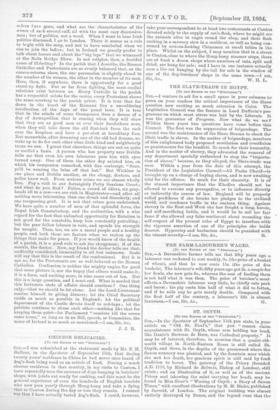THE SLAVE-TRADE IN EGYPT.
[To THE EDITOR OP THE " SPECTATOR."] Sfn,—I venture to ask for a small space in your columns to- press on your readers the critical importance of the Slave. question now exciting so much attention in Cairo. The. Legislative Council was the feature in Lord Dufferin's pro- gramme on which most stress was laid by the Liberals. It was the guarantee of Progress. Now what do we see Within three years two questions have come before this. Council. The first was the suppression of brigandage. The second was the maintenance of the Slave Bureau to check the illicit traffic in slaves. In the matter of brigandage, members of this enlightened body proposed mutilation and crucifixion as punishments for the banditti. So much for their humanity. And in the matter of slavery, they advocated the removal of any department specially authorised to stop the "importa- tion of slaves," because, as they alleged, the Slave-trade was over. Within a year from the date of this attempt, the President of the Legislative Council—Ali Pasha Cherif—is brought up on a charge of buying slaves, and is now awaiting trial for the offence. So much for their sincerity. It is of the utmost importance that the Khedive should not be allowed to exercise any prerogative, or to influence directly or indirectly the course of law. England will be properly called perfidious if she breaks her pledges to the civilised world, and condones traffic in the unclean thing. Against slavery in the East and West she has fought a long, heroics, and self-sacrificing battle, and it would be to soil her fair fame if she allowed any false sentiment about wounding the self-respect of the present ruler of Egypt to interfere with the vigorous assertion of one of the principles she holds dearest. Hypocrisy and barbarism should be punished with the utmost severity.—I am, Sir, &o., B.


































 Previous page
Previous page